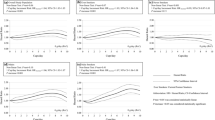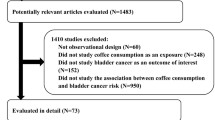Abstract
The aim of the study was to investigate NAT1, NAT2, GSTM1, GSTT1, GSTP1, SULT1A1, XRCC1, XRCC3 and XPD genetic polymorphisms, coffee consumption and risk of bladder cancer (BC) through a hospital-based case–control study. The study population included 197 incident BC cases and 211 controls. The association between genetic polymorphisms, coffee drinking and BC risk was assessed by logistic regression taking into account age, education, tobacco smoking and occupational exposures to polycyclic aromatic hydrocarbons and aromatic amines. No association was found between the genetic polymorphisms investigated and BC risk according to coffee consumption apart of a significant increased BC risk among GSTP1 105-114 Val carriers heavy coffee drinkers (>3 cups/day) (OR 3.18, 95%CI 1.06–9.55). In conclusion our findings suggest a very limited role, if any, of genetic polymorphisms investigated in modulating the BC risk in coffee drinkers.
Similar content being viewed by others
Abbreviations
- AA:
-
Aromatic amines
- BC:
-
Bladder cancer
- CI:
-
Confidence interval
- GST:
-
Glutathione S-transferases
- HWE:
-
Hardy–Weinberg equilibrium
- NAT:
-
N-acetyltransferase
- OR:
-
Odds ratio
- PAH:
-
Polycyclic aromatic hydrocarbons
- SULT1A1:
-
Sulfotransferase 1A1
- XPD:
-
Xeroderma pigmentosum complementation group
- XRCC:
-
X-ray repair cross-complementing
References
Madeb R, Messing EM. Gender, racial and age differences in bladder cancer incidence and mortality. Urol Oncol. 2004;22:86–92.
AIRT Working Group. I tumori in Italia—rapporto 2006. Incidenza, mortalità e stime. Epidemiol Prev. 2006;30:1–141.
Pelucchi C, Bosetti C, Negri E, Malvezzi M, La Vecchia C. Mechanisms of disease: the epidemiology of bladder cancer. Nat Clin Pract Urol. 2006;3:327–40.
Kogevinas M, Trichopoulos D. Urinary bladder cancer. In: Adami HO, Hunter D, Trichopoulos D, editors. Textbook of cancer epidemiology. New York: Oxford University Press; 2002. p. 446–66.
International Agency for Research on Cancer (IARC). Coffee, tea, mate, methylxanthines and methylglyoxal. Lyon: IARC Monographs on the Evaluation of Carcinogenic Risks to Humans; 1991.
Geoffroy-Perez B, Cordier S. Fluid consumption and the risk of bladder cancer: results of a multicenter case–control study. Int J Cancer. 2001;93:880–7.
Sala M, Cordier S, Chang-Claude J, Donato F, Escolar-Pujolar A, Fernandez F, Gonzalez CA, Greiser E, Jockel KH, Lynge E, Mannetje A, Pohlabeln H, Porru S, Serra C, Tzonou A, Vineis P, Wahrendorf J, Boffetta P, Kogevina M. Coffee consumption and bladder cancer in nonsmokers: a pooled analysis of case–control studies in European countries. Cancer Causes Control. 2000;11:925–31.
Tavani A, La Vecchia C. Coffee and cancer: a review of epidemiological studies, 1990–1999. Eur J Cancer Prev. 2000;9:241–56.
Villanueva CM, Cantor KP, King WD, Jaakkola JJ, Cordier S, Lynch CF, Porru S, Kogevinas M. Total and specific fluid consumption as determinants of bladder cancer risk. Int J Cancer. 2006;118:2040–7.
Woolcott CG, King WD, Marrett LD. Coffee and tea consumption and cancers of the bladder, colon and rectum. Eur J Cancer Prev. 2002;11:137–45.
Zeegers MP, Dorant E, Goldbohm RA, van den Brandt PA. Are coffee, tea, and total fluid consumption associated with bladder cancer risk? Results from the Netherlands Cohort Study. Cancer Causes Control. 2001;12:231–8.
Zeegers MP, Tan FE, Goldbohm RA, van den Brandt PA. Are coffee and tea consumption associated with urinary tract cancer risk? A systematic review and meta-analysis. Int J Epidemiol. 2001;30:353–62.
Strange RC, Fryer AA. The glutathione S-transferases: influence of polymorphism on cancer susceptibility. In: Vineis P, Malats N, Lang M, d’Errico A, Caporaso N, Cuzick J, Boffetta P, editors. Metabolic polymorphisms and susceptibility to cancer. Lyon: IARC Scientific publications No 148; 1999. p. 231–49.
Hung RJ, Boffetta P, Brennan P, Malaveille C, Hautefeuille A, Donato F, Gelatti U, Spaliviero M, Placidi D, Carta A, Scotto di Carlo A, Porru S. GST, NAT, SULT1A1, CYP1B1 genetic polymorphisms, interactions with environmental exposures and bladder cancer risk in a high-risk population. Int J Cancer. 2004;110:598–604.
Engel LS, Taioli E, Pfeiffer R, Garcia-Closas M, Marcus PM, Lan Q, Boffetta P, Vineis P, Autrup H, Bell DA, Branch RA, Brockmöller J, Daly AK, Heckbert SR, Kalina I, Kang D, Katoh T, Lafuente A, Lin HJ, Romkes M, Taylor JA, Rothman N. Pooled analysis and meta-analysis of glutathione S-transferase M1 and bladder cancer: a HuGE review. Am J Epidemiol. 2002;156:95–109.
Sanderson S, Salanti G, Higgins J. Joint effects of the N-acetyltransferase 1 and 2 (NAT1 and NAT2) genes and smoking on bladder carcinogenesis: a literature-based systematic HuGE review and evidence synthesis. Am J Epidemiol. 2007;166:741–51.
Kellen E, Hemelt M, Broberg K, Golka K, Kristensen VN, Hung RJ, Matullo G, Mittal RD, Porru S, Povey A, Schulz WA, Shen J, Buntinx F, Zeegers MP, Taioli E. Pooled analysis and meta-analysis of the glutathione S-transferase P1 Ile 105Val polymorphism and bladder cancer: a HuGE-GSEC review. Am J Epidemiol. 2007;165:1221–30.
Glatt H, Engelke CE, Pabel U, Teubner W, Jones AL, Coughtrie MW, Andrae U, Falany CN, Meinl W. Sulfotransferases: genetics and role in toxicology. Toxicol Lett. 2000;112–113:341–8.
Vineis P, Malats N, Lang M, d’Errico A, Caporaso N, Cuzick J, Boffetta P, editors. Metabolic polymorphisms and susceptibility to cancer. Lyon: IARC Scientific publications No 148; 1999.
Zheng L, Wang Y, Schabath MB, Grossman HB, Wu X. Sulfotransferase 1A1 (SULT1A1) polymorphism and bladder cancer risk: a case–control study. Cancer Lett. 2003;202:61–9.
Gu J, Liang D, Wang Y, Lu C, Wu X. Effects of N-acetyl transferase 1 and 2 polymorphisms on bladder cancer risk in Caucasians. Mutat Res. 2005;581:97–104.
Karagas MR, Park S, Warren A, Hamilton J, Nelson HH, Mott LA, Kelsey KT. Gender, smoking, glutathione-S-transferase variants and bladder cancer incidence: a population-based study. Cancer Lett. 2005;219:63–9.
Huber WW, Parzefall W. Modification of N-acetyltransferases and glutathione S-transferases by coffee components: possible relevance for cancer risk. Methods Enzymol. 2005;401:307–41.
Huber WW, Rossmanith W, Grusch M, Haslinger E, Prustomersky S, Peter-Vörösmarty B, Parzefall W, Scharf G, Schulte-Hermann R. Effects of coffee and its chemopreventive components kahweol and cafestol on cytochrome P450 and sulfotransferase in rat liver. Food Chem Toxicol. 2007;25 [Epub ahead of print].
Porta M, Vioque J, Ayude D, Alguacil J, Jariod M, Ruiz L, Murillol JA. Coffee drinking: the rationale for treating it as a potential effect modifier of carcinogenic exposures. Eur J Epidemiol. 2003;18:289–98.
Link CJ Jr, Evans MK, Cook JA, Muldoon R, Stevnsner T, Bohr VA. Caffeine inhibits gene-specific repair of UV-induced DNA damage in hamster cells and in human xeroderma pigmentosum group C cells. Carcinogenesis. 1995;16:1149–55.
Goode EL, Ulrich CM, Potter JD. Polymorphisms in DNA repair genes and associations with cancer risk. Cancer Epidemiol Biomarkers Prev. 2002;11:1513–30.
Matullo G, Guarrera S, Sacerdote C, Polidoro S, Davico L, Gamberini S, Karagas M, Casetta G, Rolle L, Piazza A, Vineis P. Polymorphisms/haplotypes in DNA repair genes and smoking: a bladder cancer case–control study. Cancer Epidemiol Biomarkers Prev. 2005;14:2569–78.
Shen M, Hung RJ, Brennan P, Malaveille C, Donato F, Placidi D, Carta A, Hautefeuille A, Boffetta P, Porru S. Polymorphisms of the DNA repair genes XRCC1, XRCC3, XPD, interaction with environmental exposures, and bladder cancer risk in a case–control study in northern Italy. Cancer Epidemiol Biomarkers Prev. 2003;12:1234–40.
Hung RJ, Brennan P, Malaveille C, Porru S, Donato F, Boffetta P, Witte JS. Using hierarchical modeling in genetic association studies with multiple markers: application to a case–control study of bladder cancer. Cancer Epidemiol Biomarkers Prev. 2004;13:1013–21.
García-Closas M, Malats N, Real FX, Welch R, Kogevinas M, Chatterjee N, Pfeiffer R, Silverman D, Dosemeci M, Tardón A, Serra C, Carrato A, García-Closas R, Castaño-Vinyals G, Chanock S, Yeager M, Rothman N. Genetic variation in the nucleotide excision repair pathway and bladder cancer risk. Cancer Epidemiol Biomarkers Prev. 2006;15:536–42.
Hung RJ, Boffetta P, Brennan P, Malaveille C, Gelatti U, Placidi D, Carta A,Hautefeuille A, Porru S. Genetic polymorphisms of MPO, COMT, MnSOD, NQO1, interactions with environmental exposures and bladder cancer risk. Carcinogenesis. 2004;25:973–8.
Porru S, Placidi D, Carta A, Gelatti U, Ribero ML, Tagger A, Boffetta P, Donato F. Primary liver cancer and occupation in men: a case–control study in high-incidence area in Northern Italy. Int J Cancer. 2001;94:878–83.
Donato F, Boffetta P, Fazioli R, Aulenti V, Gelatti U, Porru S. Bladder cancer, tobacco smoking, coffee and alcohol drinking in Brescia, northern Italy. Eur J Epidemiol. 1997;13:795–800.
Pohlabeln H, Jockel KH, Bolm-Audorff U. Non-occupational risk factors for cancer of the lower urinary tract in Germany. Eur J Epidemiol. 1999;15:411–9.
Murta-Nascimento C, Silverman DT, Kogevinas M, García-Closas M, Rothman N, Tardón A, García-Closas R, Serra C, Carrato A, Villanueva C, Dosemeci M, Real FX, Malats N. Risk of bladder cancer associated with family history of cancer: do low-penetrance polymorphisms account for the increase in risk? Cancer Epidemiol Biomarkers Prev. 2007;16:1595–600.
Garcia-Closas M, Malats N, Silverman D, Dosemeci M, Kogevinas M, Hein DW, Tardon A, Serra C, Carrato A, Garcia-Closas R, Lloreta J, Castano-Vinyals G, Yeager M, Welch R, Chanock S, Chatterjee N, Wacholder S, Samanic C, Tora M, Fernandez F, Real FX, Rothman N. NAT2 slow acetylation, GSTM1 null genotype, and risk of bladder cancer: results from the Spanish Bladder Cancer Study and meta-analyses. Lancet. 2005;366:649–59.
Srivastava DS, Mishra DK, Mandhani A, Mittal B, Kumar A, Mittal RD. Association of genetic polymorphism of glutathione S-transferase M1, T1, P1 and susceptibility to bladder cancer. Eur Urol. 2005;48:339–44.
Matullo G, Guarrera S, Carturan S, Peluso M, Malaveille C, Davico L, Piazza A, Vineis P. DNA repair gene polymorphisms, bulky DNA adducts in white blood cells and bladder cancer in a case–control study. Int J Cancer. 2001;92:562–7.
Nehlig A, Debry G. Potential genotoxic, mutagenic and antimutagenic effects of coffee: a review. Mutat Res. 1994;317:145–62.
Majer BJ, Hofer E, Cavin C, Lhoste E, Uhl M, Glatt HR, Meinl W, Knasmuller S. Coffee diterpenes prevent the genotoxic effects of 2-amino-1-methyl-6-phenylimidazo[4,5-b]pyridine (PhIP) and N-nitrosodimethylamine in a human derived liver cell line (HepG2). Food Chem Toxicol. 2005;43:433–41.
Okamura S, Suzuki K, Yanase M, Koizumi M, Tamura HO. The effects of coffee on conjugation reactions in human colon carcinoma cells. Biol Pharm Bull. 2005;28:271–4.
Donato F, Boffetta P, Fazioli R, Gelatti U, Porru S. Reliability of data on smoking habit and coffee drinking collected by personal interview in a hospital-based case–control study. Eur J Epidemiol. 1998;14:259–67.
Schaid DJ, Jacobsen SJ. Biased tests of association: comparisons of allele frequencies when departing from Hardy–Weinberg proportions. Am J Epidemiol. 1999;149:706–11.
Armitage P, Berry G. Statistical methods in medical research. 3rd ed. Oxford: Blackwell Scientific Publications; 1994.
Wacholder S, Chanock S, Garcia-Closas M, El Ghormli L, Rothman N. Assessing the probability that a positive report is false: an approach for molecular epidemiology studies. J Natl Cancer Inst. 2004;96:434–42.
Author information
Authors and Affiliations
Corresponding author
Rights and permissions
About this article
Cite this article
Covolo, L., Placidi, D., Gelatti, U. et al. Bladder cancer, GSTs, NAT1, NAT2, SULT1A1, XRCC1, XRCC3, XPD genetic polymorphisms and coffee consumption: a case–control study. Eur J Epidemiol 23, 355–362 (2008). https://doi.org/10.1007/s10654-008-9238-2
Received:
Accepted:
Published:
Issue Date:
DOI: https://doi.org/10.1007/s10654-008-9238-2




